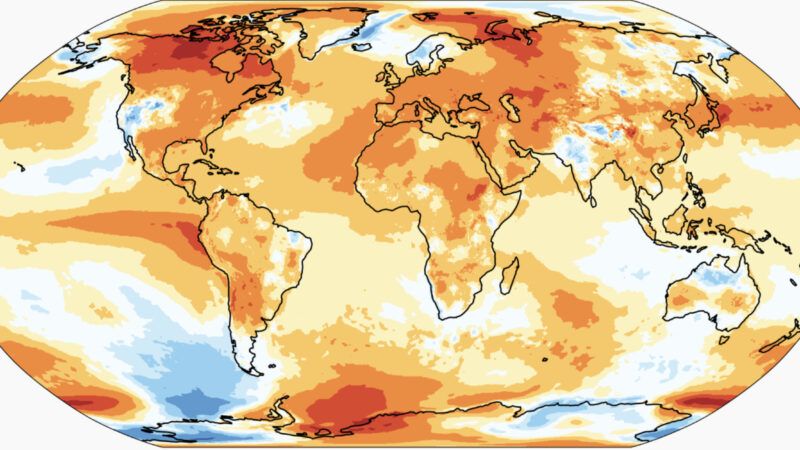It's Official: 2023 Was the Hottest Year on Record
And 2024 could be even warmer.

The European Union's Copernicus Climate Change Service (C3S) reports that 2023 was the hottest year in the instrumental temperature record. That's in part because global temperatures were boosted by the El Niño phenomenon in which the eastern Pacific Ocean surface temperature periodically surges higher.
So how hot was 2023? C3S notes:
- 2023 had a global average temperature of 14.98°C, 0.17°C higher than the previous highest annual value in 2016
- 2023 was 0.60°C warmer than the 1991-2020 average and 1.48°C warmer than the 1850-1900 pre-industrial level
- It is likely that a 12-month period ending in January or February 2024 will exceed 1.5°C above the pre-industrial level
- 2023 marks the first time on record that every day within a year has exceeded 1°C above the 1850-1900 pre-industrial level. Close to 50% of days were more then [sic] 1.5°C warmer than the 1850-1900 level, and two days in November were, for the first time, more than 2°C warmer.

The 2015 Paris Climate Agreement aims to hold "the increase in the global average temperature to well below 2 °C above pre-industrial levels and pursuing efforts to limit the temperature increase to 1.5 °C above pre-industrial levels." The global average temperature in 2023 was just below the 1.5 degrees Celsius threshold.
"Not only is 2023 the warmest year on record, it is also the first year with all days over 1°C warmer than the pre-industrial period. Temperatures during 2023 likely exceed those of any period in at least the last 100,000 years," noted Samantha Burgess, deputy director of C3S, in a press release.
The satellite temperature series run by climatologists Roy Spencer and John Christy at the University of Alabama in Huntsville (UAH) also basically concurs, reporting that 2023 is the hottest year in its 45-year record.

"The 2023 annual average global [lower tropospheric temperature] anomaly was +0.51 deg. C above the 1991-2020 mean, easily making 2023 the warmest of the 45-year satellite record. The next-warmest year was +0.39 deg. C in 2016," notes Spencer.
The C3S report observed that atmospheric greenhouse gas concentrations reached the highest levels ever recorded, 419 parts per million for carbon dioxide and 1902 parts per billion for methane. UAH's Christy cautiously concedes that the "background climate-trend is about +0.1 °C per decade and could represent the warming effect of the extra greenhouse gases that are being added to the atmosphere as human development progresses."
What comes next?
"We expect the strong El Nino in the Pacific to impact the global temperature through 2024. For this reason we are forecasting 2024 to be another record breaking year, with the possibility of temporarily exceeding 1.5C for the first time," observed U.K. Met Office climate scientist Nick Dunstone in the Bournemouth Daily Echo.


Show Comments (146)